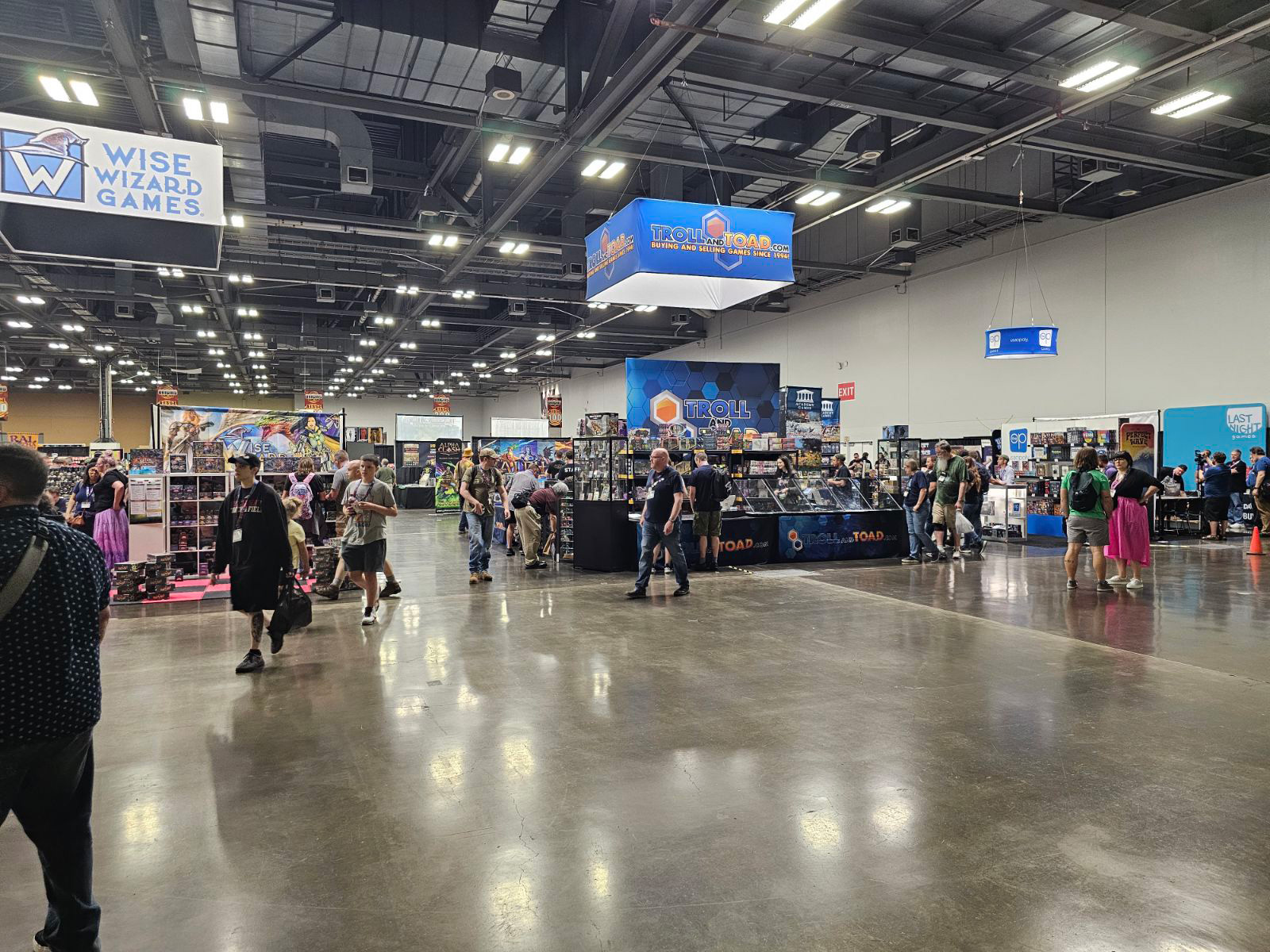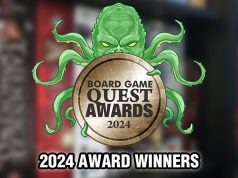Origins is one of my local cons, but I hadn’t made it down to the Greater Columbus Convention Center for Origins since 2019. My usual game plan for Origins, and conventions in general, is to load up my schedule beforehand with preplanned gaming sessions. I occasionally sign up for a few official con events, but generally, I fill up my time with games found on the “What are you bringing? What are you playing?” geeklist on BGG. This year, however, I opted to leave my schedule open and decide which games to play on-site.
Quite a few aspects of Origins were different this time around. For one, the game library provided by the Columbus Area Boardgaming Society (my local game club) was free and open to all badge-holders this year. Previously, you’d need to buy an additional ribbon to access the library of over 1300 games and to grab a table within the large, dedicated open-gaming area, previously called the Board Room. It seemed that they’d increased the space in the open gaming section, and there was plenty of room between tables. This area did get pretty crowded on Friday and Saturday during the heaviest times, but our group managed to find a table for gaming whenever we needed one. While I have access to the CABS library on a weekly basis, I’ve used it less and less lately as my group owns too many games that we haven’t gotten around to playing yet. For Origins, though, we relied on the club’s vast selection and frequently stood in front of the game cabinets playing the “what are we going to play?” minigame, which supports 1-4 players and plays in about 15 minutes. So, this con was a chance for me to get in a few games that I’ve been interested in over the last few years, but hadn’t gotten around to trying out.
Origins is an ideal convention for just hanging out and playing games. Sure, there’s the huge vendor hall with plenty of shiny new things for purchase. But there’s a definite emphasis on getting those purchases onto a table and enjoying them, along with other great games that you or someone else has brought. There’s a whole slew of official events offered on the Origins schedule. These include board and RPG game sessions, seminars, and even activities like building your own foam sword. In years past, you’d need to purchase an event ticket or “generic” tokens in order to get into these events. This year, however, many events were free, with most paid ones being those that required some material cost, such as the foam sword class. One of the free activities I took part in was a “paint and take” session where you can grab a miniature and paint it using provided paints and brushes. It was fun, but my janky wizard cat wouldn’t have won any prizes, so I’ll not be applying a brush to my Final Girl minis any time soon.
So what are some of the older games I finally got around to playing at Origins this year? Well, Cascadia has been fairly popular the last couple of years, so I decided to see what all the buzz was about. If you’re not familiar, it’s a tile placement game with the innovation that you’re creating patterns not only with the habitats printed on tiles but also with the animal tokens that you place on those tiles. So, you’ll want to have wildlife tokens in groups with specific configurations in addition to large swaths of matching terrain. I actually got the game out twice during the week to play with different groups. It’s lighter than what I generally tend to play, but it was still enjoyable enough that I’d sit down to play it again if it’s on the table.
 I also played The Guild of Merchant Explorers for the first time, which was described to me as a roll-and-write, but with cubes. I suppose that’s a fair, if simplistic, explanation of the game. Each player has their own map with hexes containing various types of terrain. Every turn, a card is revealed with a terrain type into which you’re able to place cubes, “exploring” that territory. You can earn coins by exploring certain hexes and place down villages when you’ve fully explored an area, which helps you to reach further in later eras. This is probably the game played during Origins that I’m most interested in getting back out soon. It’s another light entry, but it was relaxing and fun. A nice way to wind down after longer, heavier games.
I also played The Guild of Merchant Explorers for the first time, which was described to me as a roll-and-write, but with cubes. I suppose that’s a fair, if simplistic, explanation of the game. Each player has their own map with hexes containing various types of terrain. Every turn, a card is revealed with a terrain type into which you’re able to place cubes, “exploring” that territory. You can earn coins by exploring certain hexes and place down villages when you’ve fully explored an area, which helps you to reach further in later eras. This is probably the game played during Origins that I’m most interested in getting back out soon. It’s another light entry, but it was relaxing and fun. A nice way to wind down after longer, heavier games.
A few other new-to-me games were Alma Mater and The Taverns of Tiefenthal, both of which were a little disappointing and didn’t quite reach the expectations I’d built up for them. I also got in some plays of games that I’ve enjoyed in the past, such as Concordia, Marrakesh, and The Quest for El Dorado.
While Origins has historically not been the site of as many hot releases as Gen Con, the number of buzzworthy new games seemed down this year. I heard that a few games, like Earth and Thunder Road: Vendetta, had sold out during the con, but it didn’t feel like there were any must-have games at Origins this year. Also, several big booth presences were noticeably absent this year, so the vendor hall felt more sparse than usual. Nevertheless, I did manage to demo some interesting offerings in publishers’ booths.

Kapow! Volume 2, a superhero vs supervillain dice-building game from Wise Wizard Games, will be hitting retail soon and adds six more characters to the ones introduced in Volume 1. You’ll be rolling dice behind your player screen and assigning them to various attacks, defenses, and power up abilities, such as Time Jump and Teleport. In addition to basic trait dice, players will gain action dice with removable faces that can be used to customize their hero or villain. Kapow! is a fun dice-chucker with an exciting theme, but the main draw for me is the ability to customize your character by building a dice pool and modifying the action dice.
Although there are plenty of titles in the “make your own alcoholic beverages” subgenre, Distilled from Paverson Games still piqued my interest when I walked by. The game has a nice table presence and the overview I got made it sound appealing. You’ll be combining ingredients as you distill spirits like whiskey, vodka, and soju, then aging them in barrels. This process will add flavors to your spirit, such as earthy, smoky, or even rubber tires. This is a press-your-luck element that could lead to some disappointment, but may yield some laughs as well. When you’re ready to sell the spirit, it will be bottled and converted to victory points. There are enough fresh mechanisms going on that I’d be interested in getting in a full game of this one sometime soon.
Mission Control: Critical Orbit is a cooperative, real-time roll-and-write from 3WS Games. Players will have asymmetric roles as Flight Controllers trying to help the Aethernaut Flight Commander repair their damaged rocket and get home safely. Each person has a different sheet to work with in order to contribute to the Flight Commander’s puzzle of linking nodes via polyominoes. For instance, one player will be using the die rolls to play a sort of Sudoku puzzle that will unlock pieces for the Aethernaut. The game is a unique take on roll-and-writes, giving each player something different to do while working together to complete a challenge. I’m looking forward to playing this one more and hope it’s a hit with my group.
I took a look at a few other, lighter games while roaming the vendor hall throughout the week. Fiction by Allplay is kind of like Wordle with the added wrinkle of having one player be the “lie-brarian,” who is actively trying to deceive the others by giving them fake clues. The other novelty is that the target words come from passages in works of literature such as A Christmas Carol and Treasure Island. Tome: The Light Edition, from Reversal Games, is a trick-taker where you’re playing spells to win tricks by using the special effects on the spell cards. Expansion packs add new spell types, which can be mixed together to create new interactions in every game. Deep Water Games’s MonsDRAWsity has one player describing a bizarre monster after looking at its picture for 20 seconds. Then the other players must each draw a sketch of the creature based on this verbal description given from memory. Hilarity ensues.
 All in all, it was a lot of fun returning to Origins and getting some solid gaming in. While the decrease in publisher presence and attendance numbers was noticeable as compared to my last visit, it does seem that things are increasing steadily back towards pre-2020 numbers. For instance, this year Origins saw about 16,000 attendees, which is up from about 11,000 in 2022, but short of the over 20,000 that attended in 2019. In any case, though, it’s still an excellent convention for playing good games, chatting with other gamers, and eating great food. Insert plug here for the jhol momos at Momo Ghar in North Market.
All in all, it was a lot of fun returning to Origins and getting some solid gaming in. While the decrease in publisher presence and attendance numbers was noticeable as compared to my last visit, it does seem that things are increasing steadily back towards pre-2020 numbers. For instance, this year Origins saw about 16,000 attendees, which is up from about 11,000 in 2022, but short of the over 20,000 that attended in 2019. In any case, though, it’s still an excellent convention for playing good games, chatting with other gamers, and eating great food. Insert plug here for the jhol momos at Momo Ghar in North Market.






















